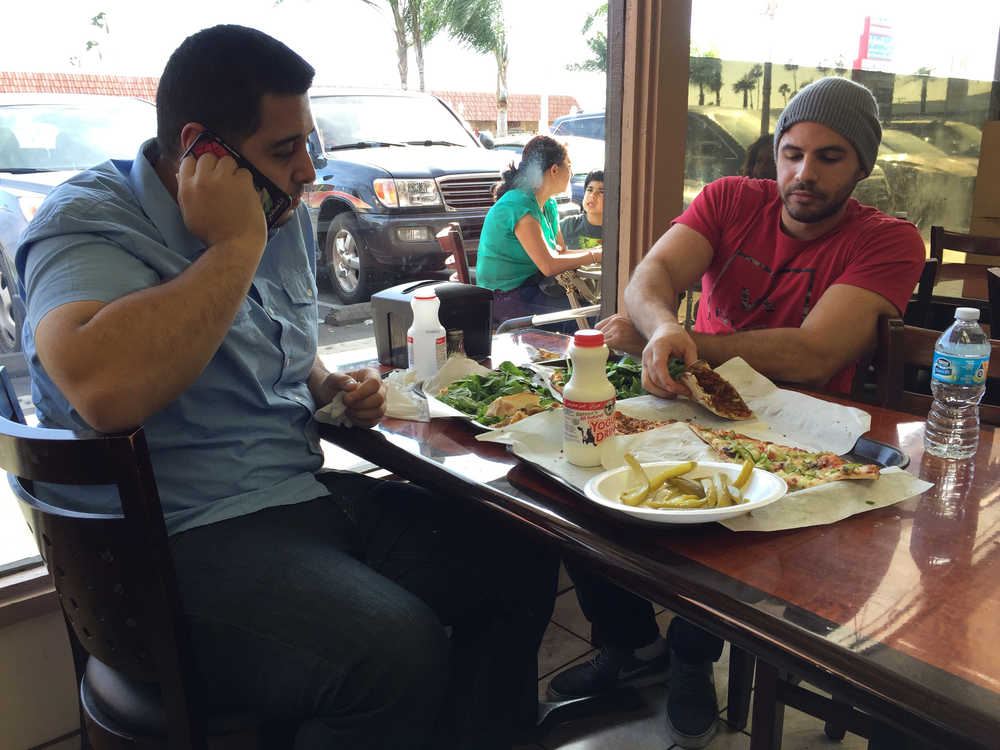ANAHEIM, Calif. — A few miles from Disneyland is a place most California tourists never see. The signs along the thoroughfare suddenly switch to Arabic script advertising hookah shops, Middle Eastern sweets, halal meat and travel services.
At a run-down strip mall in Little Arabia, flags from a half-dozen Muslim countries flap in a stiff breeze. Flying above them all is a giant American flag.
After Sen. Ted Cruz called for increased surveillance of Muslims in the U.S., this Muslim community and others like it defied the Republican presidential candidate and defended their commitment to the United States. The editor of an Arabic-language newspaper said Muslims are “already part of the country, whether he likes it or not.”
Inside a Lebanese eatery called Forn Al Hara, immigrants from Syria, Lebanon, Palestine and Iraq debated the latest political rhetoric from the GOP candidates. The men ate flatbread pizzas and sipped strong black tea with mint leaves.
“I was born and raised here. I see myself as an American. You know?” said Omar Ghanim, 23, who grew up in Southern California with parents of Palestinian heritage.
“Everything’s the same between me and the rest of the Americans out there. There’s nothing really different about us.”
Ghanim said the Islamic State doesn’t represent his faith.
“They don’t follow the Islamic rules or anything Islam,” he said. “We’re a peaceful people. We’re not violent.”
Cruz said Tuesday that law enforcement should be empowered to “patrol and secure Muslim neighborhoods before they become radicalized.” Echoing earlier statements from rival Donald Trump, Cruz also said the U.S. should stop the flow of refugees from countries where the Islamic State has a significant presence.
Muslims across the country and groups including the Council on American-Islamic Relations and the Anti-Defamation League condemned Cruz’s statements. In Washington, Deputy Attorney General Sally Yates was asked Wednesday at a news conference about calls to step up patrols of Muslim communities. She said the Muslim community “is one of our greatest partners in our fight against terrorism and public safety generally.”
Osman Ahmed, who lives in a Somali neighborhood in Minneapolis, said surveillance of Muslim neighborhoods “will send a message that Muslim-Americans are not a part of American society … and that’s the message that terrorism groups are willing to hear.”
Ahmad Tarek Rashid Alam, publisher of the weekly Arab World newspaper and one of the immigrants who helped build Little Arabia, said anti-Muslim statements are “nothing new.”
“This has been going on in every Islamic neighborhood for years,” he said. “But now our kids are in the police, in the Army. Are they going to watch us?”
He said Cruz’s remarks seemed aimed at exploiting prejudice to get votes.
“The way he talks, it could work maybe 40 years ago. But now, it’s too late. Islam is part of the country. . We are already in the country, we’re part of the country whether he likes it or not.”
Sam Chashku, a Syrian immigrant who arrived in 1996 and married an American-born Christian woman, said Cruz’s comments simply made him sad.
“We love this country. We came from nothing. They gave us everything. It’s crazy. This country is built on immigrants.”
Sometimes, he said, he doesn’t want to tell anyone that he’s Muslim because “people get offended, and I’m scared of hate crimes.”
Osman Ahmed, who lives in a Somali neighborhood in Minneapolis, said surveillance of Muslim neighborhoods “will send a message that Muslim-Americans are not a part of American society … and that’s the message that terrorism groups are willing to hear.”
Trump, who has proposed a temporary ban on foreign Muslims entering the U.S., praised Cruz’s plan as a “good idea” that he supports “100 percent” in an interview with CNN.
Speaking Tuesday in New York, Cruz praised the city police department’s former program of conducting surveillance in Muslim neighborhoods. He called for its reinstatement and said it could be a model for police departments nationwide.
After the 9/11 attacks, the New York Police Department used its intelligence division to cultivate informants in Muslim communities. In a series of articles, The Associated Press revealed that authorities had infiltrated dozens of mosques and Muslim student groups and investigated hundreds of them.
The program was disbanded amid complaints of religious and racial profiling.
The Detroit suburb of Dearborn is widely known as the hometown of Henry Ford, who hired Arabs and Muslims in the early days of the Ford Motor Co. and helped create what is now one of the nation’s largest and most concentrated communities of residents who trace their roots to the Middle East.
Kebba Kah, a 46-year-old Ford employee who was entering a mosque in Dearborn for evening prayers Tuesday, said the bombings in Brussels were “a very terrible thing,” and insisted such attacks are roundly rejected by all Muslims save for “a few radical groups.”
• Karoub reported from Dearborn, Michigan. Associated Press writers Vivian Salama, Jill Colvin, Steve Peoples, Ken Thomas, Lisa Lerer and Alan Fram in Washington; Jonathan Lemire and Deepti Hajela in New York; and Steve Karnowski and Amy Forliti in Minneapolis also contributed to this report.

